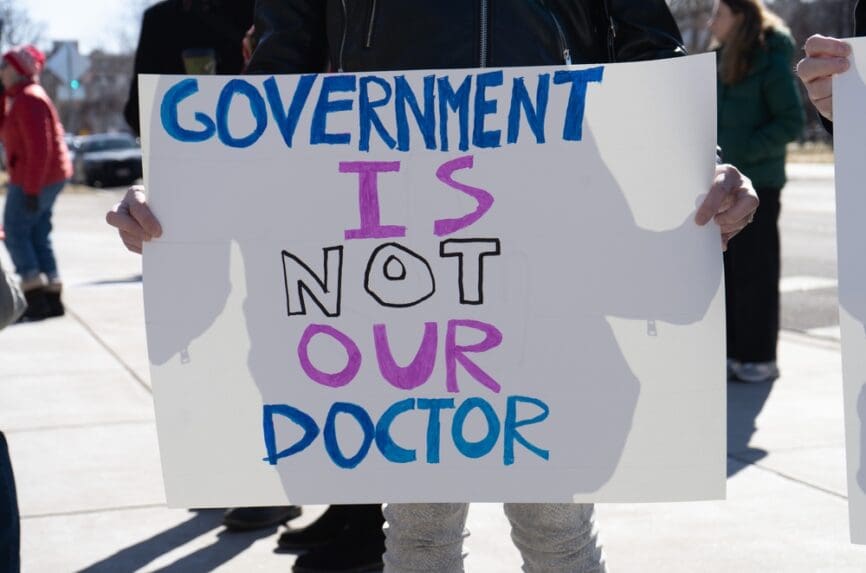Bioethics Forum Essay
Keep Politics Out of State Medical Policy
State medical boards and other government-appointed health officials have an obligation to follow evidence-based medicine to frame their opinions and regulations. However, there is disturbing evidence that, in some cases, political ideology is guiding health policy.
For example, last year the Florida State Medical Board and the Florida Board of Osteopathic Medicine banned gender-affirming care for transgender youth, going against recommendations from medical groups such as the American Association of Pediatrics and the American Medical Association. On June 6, a federal judge issued a preliminary order partially blocking the ban, which had been signed into law.
The Indiana attorney general recently filed a complaint with the state medical board against an obstetrician-gynecologist who spoke with a reporter about an abortion she provided for a 10-year-old rape victim who traveled from Ohio after that state banned most abortions after six weeks of pregnancy. While the state medical board dismissed several of the accusations by the attorney general, it found that the doctor violated the patient’s privacy rights, even though the board also found that none of the information shared with the reporter was protected under HIPAA, the federal health privacy act. The board fined the physician $3,000 and issued a letter of reprimand. The medical board’s decision may well have a chilling effect on doctors in other states where abortion is legal.
Members of state medical boards are appointed by governors and, in some states, also require senate confirmation. As such, membership is inherently political. There is no national or federal oversight of state medical boards to assure that their decisions are not political. But they have a professional obligation to make decisions and recommendations supported by evidence-based medicine, regardless of political affiliation or personal ideology. Genuine disagreement about health policy inevitably occurs among medical professionals, and when this happens, they have an ethical duty to identify a problem or issue, gather credible data, perform appropriate data analysis, and devise an evidence-based strategy for addressing the issue.
Professional medical organizations have voiced concern when state legislation and regulations are inconsistent with accepted standards of care. The AMA wrote a letter to the National Governor’s Association about state legislation banning gender-affirming care, saying, “We believe this legislation represents a dangerous governmental intrusion into the practice of medicine and will be detrimental to the health of transgender children across the country.” In a statement on its website the AAP warned, “Evidence-based medical care for transgender and gender diverse children is a complex issue. Pediatricians are best able to determine what care is necessary and appropriate for these children, but these bills [prohibiting gender-affirming care and forbidding transgender youth from participating in sports according to their gender identity] interfere in the physician-patient-family relationship and would cause undue harm.”
Among the many lessons from the Covid-19 pandemic is that the politicization of health policy contributes to mixed messaging and misinformation and decreased public trust in health officials. But the intrusion of politics into state medical information on Covid persists. A recent report found that Florida’s surgeon general selectively eliminated data that would help the public understand the importance of vaccination against Covid. This manipulation of public health information was based on ideology, not evidence.
State officials who use state medical appointees as an extension of their political power harm the public, compromise trust, and do a disservice to the profession of medicine. Medical societies have a professional duty to illuminate the politicization of medicine and expose poor public health policy. So do bioethicists, as was recently pointed out in this publication. We call on bioethicists and professional medical organizations, including the Federation of State Medical Boards, to stay vigilant and speak out against harmful medical policies enacted by state medical boards and other government-appointed health officers under the influence of political ideology.
Jessica A. Rosh, JD, MBE, is an instructor of medical ethics at New York Medical College, an educational consultant for the Benjamin Ferencz Institute for Ethics, Human Rights and the Holocaust, and a doctoral candidate in bioethics, health ethics, and policy at the Alden March Bioethics Institute at Albany Medical College.
Michael J. Murphy, PhD, is a State University of New York Distinguished Teaching Professor Emeritus, a member of the SUNY Distinguished Academy, and a doctoral candidate at Alden March Bioethics Institute.













Thank you for sharing your perspectives. A more accurate title for your essay might be, “Keep Politics with Which We Disagree Out of State Medical Policy…”
This is a strange article for the Hastings Center to publish, given its mission. Labelling ethical positions one disagrees with “political ideology” simply because those positions are used to inform policy-making reeks of the ad hominem. There are well-known and profound philosophical disagreements about what constitutes health and disease both in society and in the academic literature, and what constitutes a therapeutic vs. mutilatory procedure hinges on how one interprets those terms. In particular, those in the medical establishment who believe that health means ‘perceived well-being’ will support gender-affirming surgeries and abortion as therapeutic, while those who believe health is constituted by physiological well-functioning (like the USCCB) will believe the same interventions mutilate healthy bodies. Both affirm the basic ethical principle of non-maleficence, but do so from within very different anthropological and philosophical frameworks. Moreover, until recently, it appears, the political arena was understood as one space (among others) where disagreements over how to apply ethics to medicine should be discussed and debated. Given this context, arguing that ‘political ideology’ should be kept out of medicine either amounts to asserting that ethics should be kept out of medicine, or that the political arena should be homogenous. Neither supports the Hasting’s Center mission to ‘insert human values and the value of bioethics into public conversations’ or to support a ‘range of voices.’
What is telling about both comments is that we addressed real professional differences in medical perspectives (the EU vs. the States in particular), but advocate both evidence-based medicine as well as research and not bans on research. We are curious about the charge of “mutilatory” procedures involved in delaying puberty and gender-affirming cares since psychosocial support to help prevent depression and suicide is overwhelmingly the thrust of pre-pubescent gender-affirming care. The authors took care not to mention the removal of select data from vaccine studies (in NY it would be removal of select data from nursing home COVID deaths). Political interference with empirical studies, with clinical practice, and with public health has been fueled by mis-and disinformation and is a valid area of discussion for any discussion in biomedical ethics.
Thank you for this insightful essay. As a physician for 35 years, I have become accustomed to rhetoric and disinformation impacting the physician-patient relationship and public health systems. Politicization has affected many areas of healthcare, including reproductive medicine, infectious disease, addiction management, firearm injury studies, and gender-affirming care. The author’s examples indicate why politicians should stay out of the exam room. In addition to attempting to interfere with patient care, in 2022, Physicians for Human Rights warned that at least 26 states considered legislation to limit state medical boards from investigating harmful medical practices, including censoring physicians who espouse disinformation and conspiracy theories.“America’s Frontline Doctors,” formed by a right-wing political group, promoted false information about masking and COVID treatment–remember ivermectin and hydroxychloroquine? Republican lawmakers blocked legislative efforts to sanction or remove their licensure. One thing is clear: individual physicians and our professional organizations must actively combat demonstrably false information.
The role of state medical boards is to regulate licensure and policy while preventing personal dogma from eroding trust and impacting public health. State boards must determine whether a physician meets the recognized standards of professional conduct, as outlined, for example, in the AMA’s Principles of Medical Ethics. Yet, given the appointment to state boards is political, there is the potential for significant selection biases when choosing members.
The comments following the original post mischaracterize several issues. Good health provides for physical, cognitive, emotional, and social well-being. Any definitions provided by the USCCB may be relevant to followers but not necessarily to the general population. The Catholic Church and other religious organizations may offer tremendous support and comfort, but their teachings should uphold the practice of data-based healthcare. When any structural group promotes practices that do not honor patient autonomy, nonmaleficence, and scientific truths, clinicians must ensure that the patient receives care that supports these principles. There are many spaces where bioethical issues can be debated, including with philosophers, theologians, clinicians, and in the courts, but the political arena should not be one of them. Limiting partisan politics in healthcare is not a matter of excluding ideology from parties or persons that oppose one’s beliefs, as stated in a comment to the original post. State medical boards must reflect the objective science and evidence-based medicine that guides patient care and not submit to personal or political agendas. If the board becomes biased or a physician strays from duty, disciplinary measures are necessary.